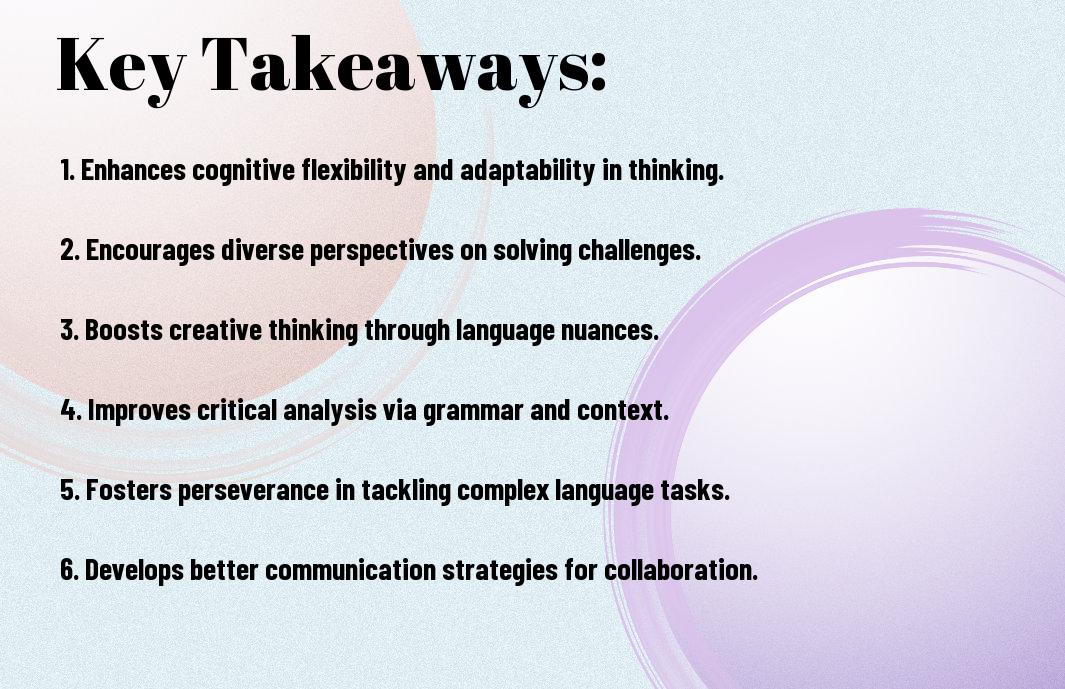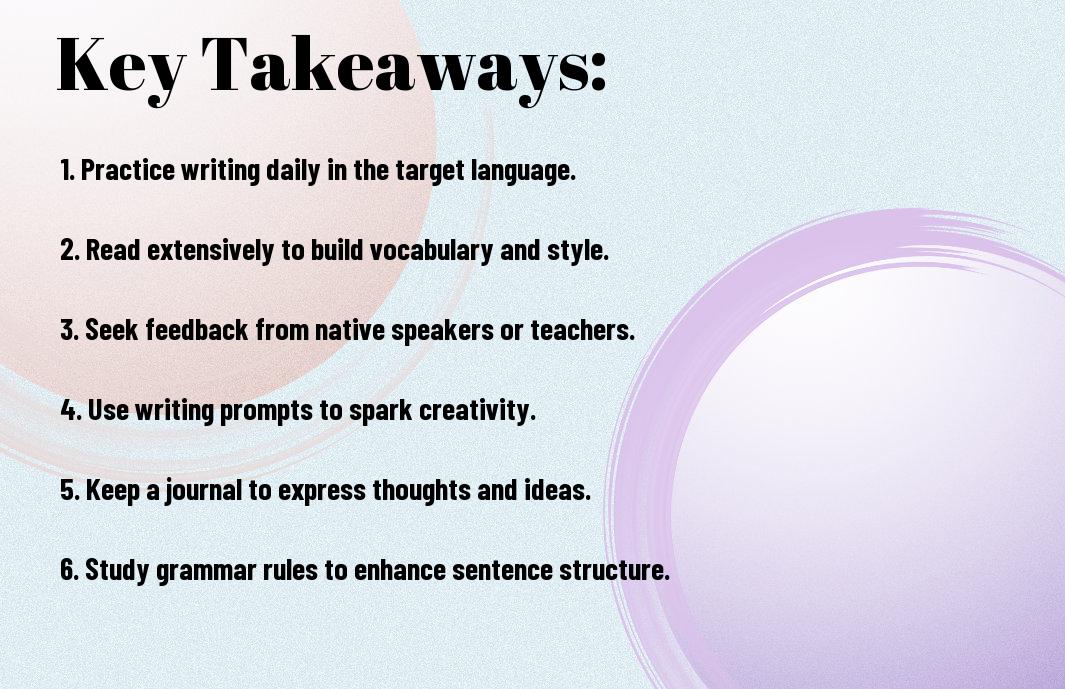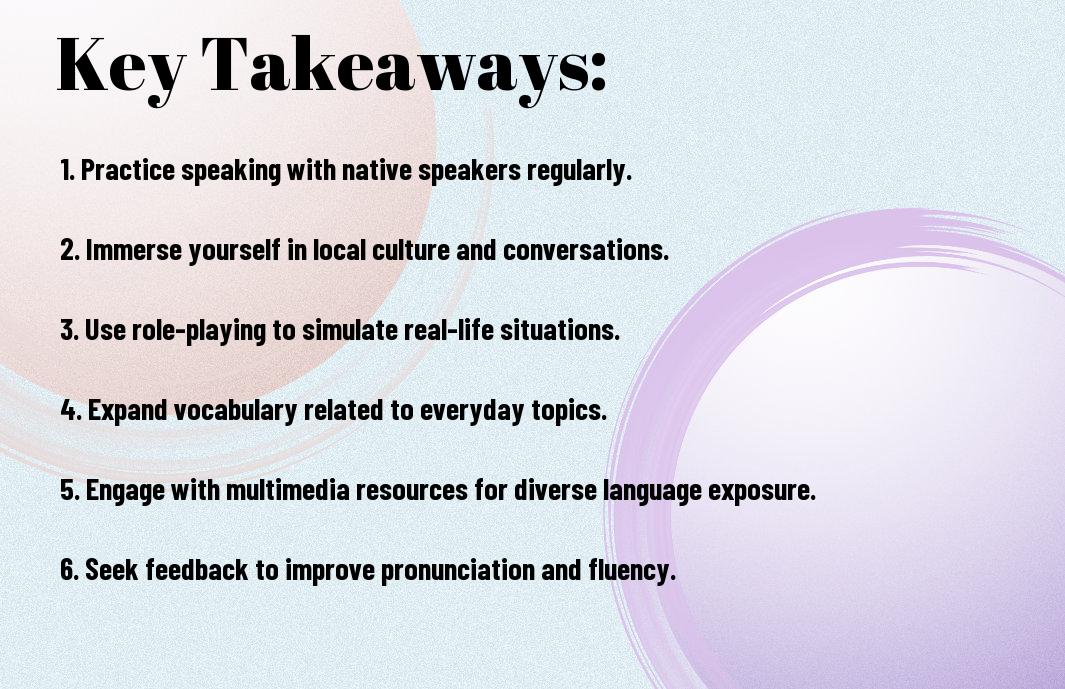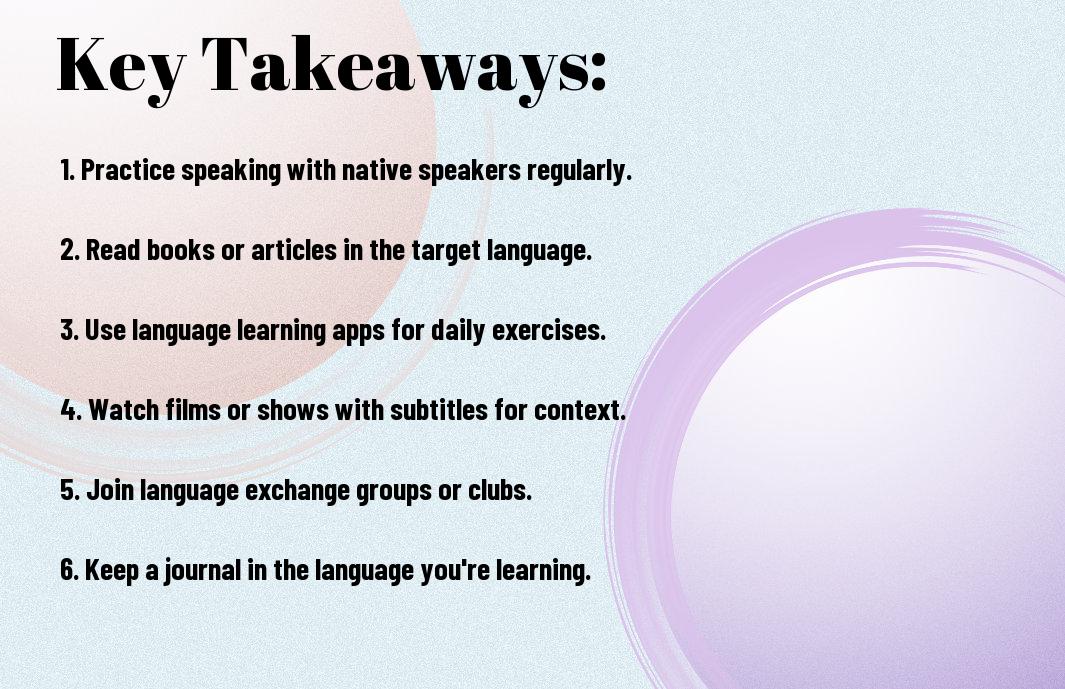As you initiate on learning a new language, you will soon discover that listening skills are just as imperative as speaking and writing. You will be exposed to various accents, dialects, and speaking styles, which can be challenging to comprehend. Your ability to understand and interpret spoken language will significantly impact your overall language proficiency. By following effective strategies and techniques, you can enhance your listening skills and become a more confident language learner, able to engage in conversations and understand different types of spoken content with ease.

Key Takeaways:
To enhance your ability to listen in a new language, consider the following points:
- Start by practicing with various types of audio materials such as podcasts, audiobooks, or news broadcasts to get accustomed to different accents and speaking styles.
- Focus on contextual listening by listening to conversations or discussions related to your interests to help you stay engaged and motivated.
- Use transcripts or subtitles to help you follow along and improve your comprehension of the spoken language.
- Try to repeat what the speaker is saying in your own words to test your understanding and to build your vocabulary.
- Make consistent effort to listen to the new language every day, even if it’s just for a few minutes, to develop your listening skills over time.
Setting Goals
Before you start improving your listening skills in a new language, it’s crucial to establish a clear plan. Setting specific goals will help you stay focused and motivated throughout the process. You need to determine what you want to achieve and how you can measure your progress.
Defining Objectives
With a clear understanding of your goals, you can define specific objectives. You will identify what aspects of listening you need to improve, such as comprehension or pronunciation, and create a roadmap for success.
Creating a Schedule
By creating a schedule, you can allocate time for listening practice and ensure consistency. You will be able to track your progress and make adjustments as needed, helping you stay on track and achieve your objectives.
Another key aspect of creating a schedule is to make it realistic and flexible. You should allow for regular practice, ideally at the same time every day, and also leave some room for adjustments as your schedule changes. This will help you develop a consistent listening habit and make steady progress in improving your skills in the new language.
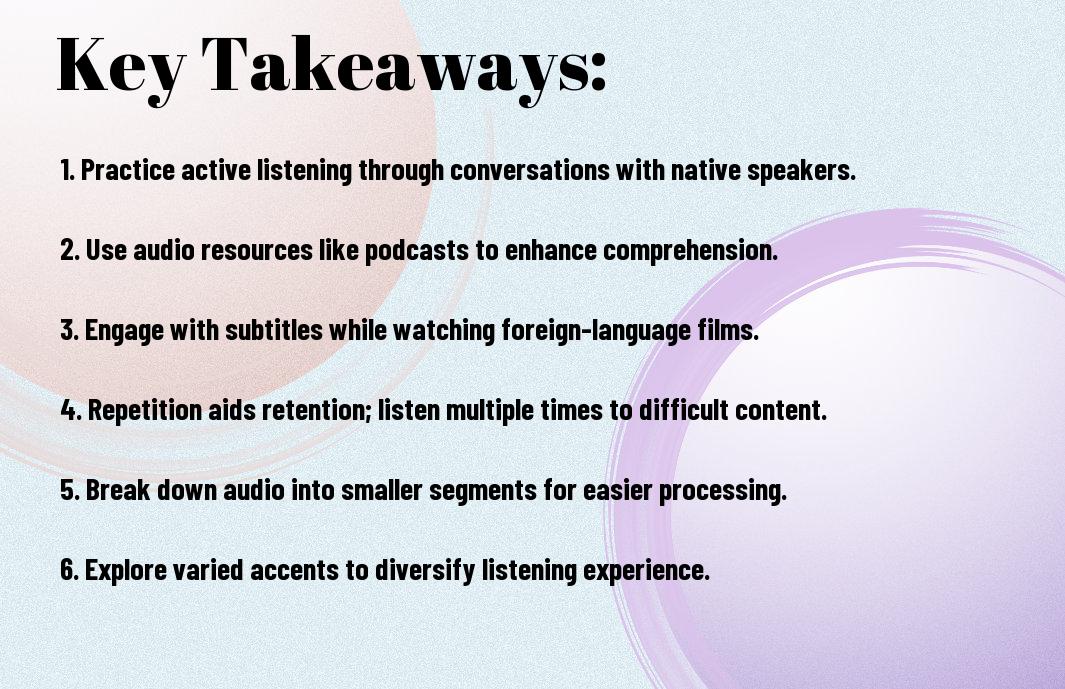
Immersion Techniques
Now that you’re looking to improve your listening skills in a new language, consider using immersion techniques to surround yourself with the language and get used to its sounds, rhythms, and nuances.
Surrounding Yourself with the Language
One of the most effective ways to improve your listening skills is to place yourself in an environment where you’re constantly exposed to the language, whether it’s through speaking with native speakers or listening to podcasts and audio recordings in your target language.
Media and Entertainment
Along with traditional learning methods, you can use media and entertainment to improve your listening skills, such as watching TV shows and movies, or listening to music in your target language, which can help you get accustomed to different accents and speaking styles.
Even if you don’t understand every word, you can still pick up on the context and overall meaning of what’s being said, and as you continue to listen, you’ll start to notice improvements in your ability to comprehend and interpret the language, helping you to become a more confident listener in your target language.
Active Listening
Keep in mind that active listening is key to improving your language skills, and you can find helpful tips in 7 Tips to Improve Your Listening Comprehension to enhance your abilities.
Focusing on Different Accents
One of the challenges you may face is understanding various accents, but with practice, you can develop your skills to recognize and comprehend different pronunciations.
Improving Concentration
Along with consistent practice, you will notice an improvement in your concentration, allowing you to focus on the conversation and grasp the context more effectively.
At this stage, you are likely to see significant progress in your listening skills, as you become more adept at filtering out distractions and maintaining attention on the speaker, which will help you to better understand and engage with the conversation.
Language Learning Tools
Many language learning tools are available to help you improve your listening skills in a new language, including online courses, language exchange websites, and audio materials.
Utilizing Language Apps
Between the numerous options, you can find apps that offer interactive lessons, quizzes, and exercises to enhance your listening skills, making it easier for you to learn and practice on-the-go.
Benefiting from Podcasts
One of the most effective ways to improve your listening skills is by listening to podcasts, which provide you with the opportunity to hear native speakers and get accustomed to different accents and speaking styles.
Plus, with podcasts, you can listen to topics that interest you, making the learning process more enjoyable and increasing your motivation to continue practicing and improving your listening skills, allowing you to better understand and engage with native speakers in your target language.
Practicing Regularly
Unlike other skills, improving listening skills in a new language requires consistent practice. You need to make it a part of your daily routine to see significant improvement.
Setting Aside Time Daily
Religiously, you should dedicate a specific time each day to listening practice, even if it’s just for a few minutes, to help your brain get accustomed to the new language.
Engaging in Conversations
Contrary to what you might think, engaging in conversations is an effective way to improve your listening skills, as it exposes you to different accents, tones, and speaking styles.
Even when you’re not speaking, you’re still learning by listening to others, so try to engage in conversations as much as possible, and you’ll see your listening skills improve over time, allowing you to better understand and process the new language.
Overcoming Challenges
Once again, you’ll encounter obstacles while improving your listening skills in a new language. You can uncover effective strategies, such as My Secret Weapon for Improving Listening Comprehension Effectively, to help you succeed.
Dealing with Difficulties
With patience and persistence, you can overcome the hurdles that come with learning to listen in a new language, and you will start to see progress in your skills.
Staying Motivated
By setting achievable goals and tracking your progress, you can maintain a high level of motivation and engagement in the learning process, which is crucial for improving your listening skills.
In fact, celebrating your small victories along the way will help you stay motivated and encouraged to continue working towards your goal of becoming proficient in listening to and understanding your new language, and you will be able to tackle more challenging tasks with confidence.
Summing up
With these considerations, you can enhance your listening skills in a new language. You will find that your comprehension and overall communication improve as you practice. For more tips, visit How to Improve Listening Skills in a Foreign Language to guide your learning journey and improve your ability to understand and engage with your new language.
FAQ
Q: What are the most effective ways to improve listening skills in a new language?
A: Improving listening skills in a new language can be achieved through consistent practice and exposure to the language. Start by listening to podcasts, audiobooks, or news in the target language for a few minutes each day. Gradually increase the duration as you become more comfortable. Additionally, watching TV shows or movies with subtitles in the target language can help you get used to the sounds, intonation, and rhythm of the language. Engaging in conversations with native speakers, either in person or online, is also an excellent way to enhance your listening skills, as it provides an opportunity to hear various accents and speaking styles.
Q: How can I overcome the challenge of understanding different accents and speaking styles in a new language?
A: To overcome the challenge of understanding different accents and speaking styles, it’s helpful to expose yourself to a variety of sources. Listen to music, watch videos, or follow social media influencers from different regions where the language is spoken. This will help you get accustomed to various accents and pronunciation. Furthermore, practice active listening by focusing on the main ideas and context rather than individual words. Using language learning apps that offer speech recognition and correction features can also be beneficial, as they can help you improve your pronunciation and comprehension of different accents.
Q: What role does patience and consistency play in improving listening skills in a new language?
A: Patience and consistency are key factors in improving listening skills in a new language. It’s a process that takes time and practice. Establishing a daily routine, even if it’s just for a few minutes, is vital. Start with simpler content and gradually move to more complex materials as your skills improve. Be patient with yourself when you encounter difficulties or feel like you’re not making progress. Celebrate small achievements, like understanding a new expression or following a conversation more easily. Consistency in practice will lead to noticeable improvements over time, helping you become more confident in your listening abilities and enhancing your overall language proficiency.
